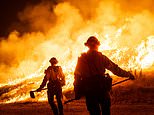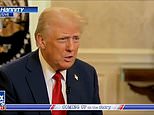Israel has killed Hezbollah's 'next leader' in a fatal blitz on a hidden bunker in the latest blow for the Iran-backed terror group.
Hashem Safieddine was killed in an Israeli airstrike in southern Beirut in early October, the Israeli military said today.
Safieddine was a powerful cleric within the Hezbollah ranks and was anticipated to succeed Hassan Nasrallah.
According to Israel, Safieddine was killed during their airstrikes in early October within a southern suburb of Beirut.
About 25 other Hezbollah leaders were also reportedly killed during the airstrike.


As the head of Hezbollah's executive council, Safieddine oversaw the group's political affairs. He also sat on the Jihad Council, where he helped manage military affairs.
His key role in the terror group made him a prime target for Israel.
Safieddine was groomed for the leadership role by Nasrallah before he was also killed in an Israeli precision airstrike on Beirut.
He wore a black turban denoting descent from Islam's Prophet Mohammed, and his physical resemblance to Nasrallah - who led the Lebanese Shi'ite group for more than three decades - also marked him as a favourite for the succession.
Safieddine hails from a prominent Lebanese Shi'ite family, and was born in the country's predominantly Shi'ite south.
He studied at religious seminaries in the Iranian city of Qom before returning to Lebanon in the 1990s to assume leadership responsibilities in the group.

Safieddine maintained strong ties to Hezbollah's backers in Iran.
His son, Rida, was married to the daughter of the late Iranian general Qassem Soleimani, head of Iran's Revolutionary Guards' Quds Force, until he was killed by a U.S. drone strike in Baghdad in 2020.
His brother, Abdullah, serves as Hezbollah's representative in Tehran.
As executive council chief, Safieddine played a role some likened to that of prime minister of a government, responsible for an array of Hezbollah institutions involved in health care, education, culture, and construction, and other activities.
He led efforts to rebuild the Hezbollah-controlled southern suburbs of Beirut following the group's 2006 war with Israel, when swathes of the area were flattened by Israeli airstrikes.












